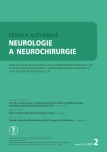Bilateral amaurosis as a rare complication of an obstructive hydrocephalus
Authors:
B. Musilová 1; D. Měšťan 1; O. Teplý 1; J. Fiedler 1,2; R. Bohatý 3,4
Authors‘ workplace:
Neurochirurgické oddělení, Nemocnice České Budějovice, a. s.
1; Neurochirurgická klinika LF UK a FN Plzeň
2; Anesteziologicko-resuscitační oddělení, Nemocnice České Budějovice, a. s.
3; Oddělení urgentního příjmu, Nemocnice České Budějovice, a. s.
4
Published in:
Cesk Slov Neurol N 2022; 85(2): 187-188
Category:
Letters to Editor
doi:
https://doi.org/10.48095/cccsnn2022187
Sources
1. Greenberg MS. Handbook of neurosurgery. Hydrocephalus – general aspects. Colloid Cyst. 9th ed. New York: Thieme 2020 : 410–421.
2. Ozmen E, Algin O. Blindness. An uncommon presentation of colloid cysts. Sultan Qaboos Univ Med J 2014; 14(1): e128–e129. doi: 10.12816/ 0003347.
3. Champeaux C, Grivas A. Teaching NeuroImages: cortical blindness following acute obstructive hydrocephalus by a colloid cyst. Neurology 2015; 84(6): e41–e42. doi: 10.1212/ WNL.0000000000001229.
4. Bernal-Garcíá LM, Cabezudo-Artero JM, Marcelo - Zamorano MB et al. Bilateral cortical occipital infarction secondary to hydrocephalus due to a colloid cyst in the third ventricle. Rev Neurol 2016; 62(4): 189–190.
Labels
Paediatric neurology Neurosurgery NeurologyArticle was published in
Czech and Slovak Neurology and Neurosurgery

2022 Issue 2
- Advances in the Treatment of Myasthenia Gravis on the Horizon
- Memantine in Dementia Therapy – Current Findings and Possible Future Applications
- Memantine Eases Daily Life for Patients and Caregivers
-
All articles in this issue
- Historical scope of the swallowing postures and maneuvers in the behavioral treatment of oropharyngeal dysphagia
- Optic nerve infiltration by large B-cell lymphoma
- Successful nonsurgical management of lumbar radiculopathy associated with disc herniation and instability in low back pain syndrome
- Z histórie Slovenskej neurologickej spoločnosti Slovenskej lekárskej spoločnosti
- Music therapy in voice and speech disorders in patients with Parkinson‘s disease
- Targeted surgery for obstructive sleep apnea
- Somatosensory temporal discrimination threshold does not discriminate between patients with essential and dystonic head tremor
- Experience with the treatment of cryptococcal meningitis
- Myositis with anti-NXP2 antibodies
- Bilateral amaurosis as a rare complication of an obstructive hydrocephalus
- The effect of computerized cognitive training on the improvement of cognitive functions of cognitively healthy elderly
- Balance disorders in patients with multiple sclerosis and possible rehabilitation therapy – current findings from controlled clinical trials
- The role of cell adhesion molecules (ICAM-1 and VCAM-1) in acute ischemic stroke
- Successful mechanical thrombectomy of the left superior cerebellar artery
- Ventricular subependymoma with intratumoral haemorrhage mimicking haemocephalus due to aneurysm rupture
- Czech and Slovak Neurology and Neurosurgery
- Journal archive
- Current issue
- About the journal
Most read in this issue
- Targeted surgery for obstructive sleep apnea
- Balance disorders in patients with multiple sclerosis and possible rehabilitation therapy – current findings from controlled clinical trials
- Successful nonsurgical management of lumbar radiculopathy associated with disc herniation and instability in low back pain syndrome
- Music therapy in voice and speech disorders in patients with Parkinson‘s disease
